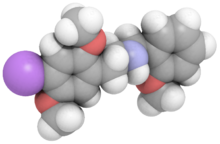25I-NBOMe
 |
|
 |
|
| Clinical data | |
|---|---|
| Routes of administration |
Buccal (sublabial), sublingual, insufflated, inhalation, intravenous, intramuscular, rectal |
| ATC code |
|
| Legal status | |
| Legal status |
|
| Identifiers | |
|
|
| CAS Number | |
| PubChem CID | |
| ChemSpider | |
| UNII | |
| ChEMBL | |
| Chemical and physical data | |
| Formula | C18H22INO3 |
| Molar mass | 427.28 g/mol |
| 3D model (Jmol) | |
|
|
|
|
|
|
|
25I-NBOMe (2C-I-NBOMe, Cimbi-5, also shortened to "25I", and colloquially referred to as "N-bomb") is a psychedelic drug and derivative of the substituted phenethylamine psychedelic 2C-I. It was discovered in 2003 by chemist Ralf Heim at the Free University of Berlin, who published his findings in his PhD dissertation. The compound was subsequently investigated by a team at Purdue University led by David Nichols.
The carbon-11 labelled version of 25I-NBOMe, [11C]Cimbi-5, was synthesized and validated as a radiotracer for positron emission tomography (PET) in Copenhagen. Being the first 5-HT2A receptor full agonist PET radioligand, [11C]-CIMBI-5 shows promise as a more functional marker of these receptors, particularly in their high affinity states.
Like other 2C-X-NBOMe molecules, 25I-NBOMe is a derivative of the 2C family of phenethylamines described by Alexander Shulgin in his book PiHKAL. Specifically, 25I-NBOMe is an N-benzyl derivative of the phenethylamine molecule 2C-I, formed by adding a 2-methoxybenzyl (BnOMe) onto the nitrogen (N) of the phenethylamine backbone. This substitution significantly increases the potency of the molecule.
25I-NBOMe can be synthesised from 2C-I and 2-methoxybenzaldehyde, via reductive alkylation. It can be done stepwise by first making the imine and then reducing the formed imine with sodium borohydride, or by direct reaction with sodium triacetoxyborohydride.
25I-NBOMe acts as a highly potent full agonist for the human 5-HT2A receptor, with a Ki of 0.044 nM, making it some sixteen times the potency of 2C-I itself at this receptor. A radiolabelled form of 25I-NBOMe can be used for mapping the distribution of 5-HT2A receptors in the brain.
...
Wikipedia
